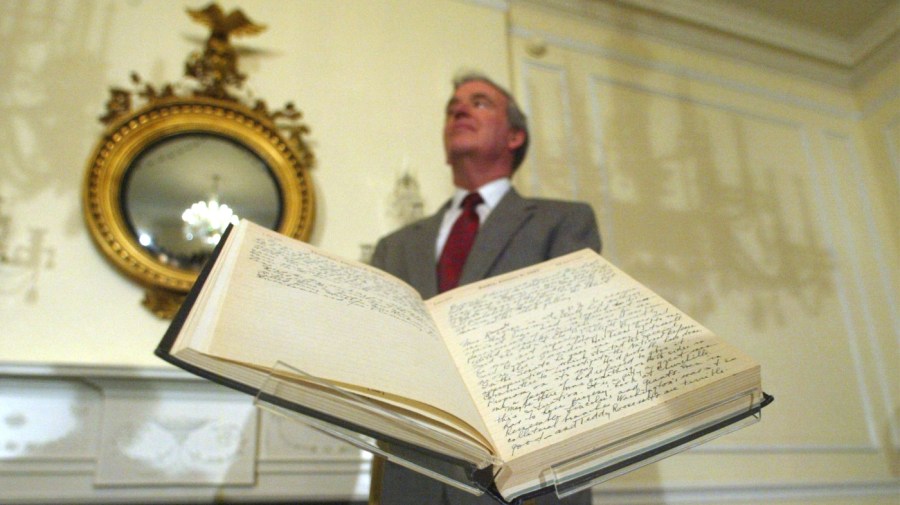In the US, a factual National Archives still exists — but for how long?

When I arrived in New York City two years ago — a Russian journalist fleeing my country after its full-scale invasion of Ukraine — I was routinely asked: “Do all Russians support Putin?”
A good question, perhaps, but I’m unable to provide a fact-based answer.
When a regime like Russia silences the press, takes control of all branches of government and installs loyalists to oversee historical records, the truth quickly disappears, becoming accessible only to the ruler’s inner circle.
Since Trump’s inauguration, conversations in the U.S. have changed. Now, when I meet Americans, they rarely mention Russian politics outside of the Ukraine war. Instead, they share their anxieties about their own country, often with a nervous laugh.
I recognize that laugh. In Russia, independent journalists and human rights activists spent years laughing over worst-case scenarios — until every single one of them came true. My Ukrainian friends have become masters of gallows humor.
Then Americans ask: “What should we do? What advice do you, who have seen this happen in your country, have for us here in the U.S.?” This again makes me laugh, given we weren’t exactly successful in stopping our own dictator.
Still, hindsight does provide some clarity, and while I don’t have immediate solutions, I do have two urgent suggestions: Safeguard your independent media and defend your national archives.
The war in Ukraine shows how, without a strong independent press and by employing a warped version of history, a dictator can act however they please.
While outsiders struggle to understand how Russians accept Putin’s justification for the invasion as a mission to “de-Nazify” Ukraine, a country led by a Jewish president, or as the reclamation of historically Russian territory (a claim that quickly unravels under serious historical scrutiny), the reality is that within Russia these narratives are now embedded in the national story.
This is the result of a deliberate reshaping of the historical narrative by the government.
Putin’s first steps in controlling Russia’s narrative was dismantling the post-Soviet independent media. It began with television, shuttering the independent NTV channel under the pretense of a business dispute.
He then tightened his grip on the media through laws, including the “foreign agent” designation, jailing reporters he disagreed with. Three days after invading Ukraine in 2022, he imposed military censorship, forcing over 1,500 journalists into exile. Today, it is illegal for journalists to contradict the government’s version of events.
This is why, in 2023, a few fellow exiled journalists and I launched the Russian Independent Media Archive: to preserve the fact-based journalism the Kremlin was so intent on erasing. Today, the archive holds 3.5 million documents from 131 (and counting!) independent national, regional and investigative outlets dating back to Putin’s first years in office.
Designed to resist takedowns and censorship, with a powerful search engine, the Russian Independent Media Archive is open to all, empowering readers, researchers and historians to challenge propaganda about a particular era with truth, and to answer questions with verified facts.
Others are better placed than I to say if a similar closing down of free speech and independent media is possible in the U.S.. The signs are certainly there in the Trump administration’s accelerated book banning campaign, ending federal funding for NPR and PBS and shutting down Voice of America.
Beyond that, Trump has unleashed a wave of chaotic actions that have directly harmed innocent people and disrupted businesses both in the U.S. and around the world — from mass deportations and abrupt firings to sweeping tariffs and threats of international conflict.
Amid this endless barrage of harmful actions, one seemingly benign yet potentially extremely dangerous move risks slipping by unnoticed: Trump’s bid to take control of the National Archives’ leadership.
Putin closed Russia’s archives stealthily, cloaking his actions in language that maintained an illusion of transparency.
In 2004, he signed a Federal Archives Law restricting access to anything labeled a “state secret.” Today, that list includes 119 broad categories — enough to conceal almost anything from public view. As a result, we Russians no longer have access to a trusted record of our country’s past.
If Americans know the National Archives, it’s usually as the home of the Declaration of Independence, the Constitution and the Bill of Rights. But it’s much more than a home for documents.
It safeguards billions of records vital to government transparency, public accountability, historical preservation, veterans’ services and the integrity of elections. These documents hold facts upon which a great many important decisions are made.
If access were restricted or content altered or erased, as is already happening on numerous government websites, truth, as in Russia, begins to disappear. For as Orwell presciently wrote in 1984, “he who controls the past controls the future.”
Covering tracks, destroying evidence, blocking websites, interfering in elections, distorting history — it’s hard to say who does it better, Putin or Trump.
But there’s still a crucial difference between my country and yours: In the U.S., your institutions are intact enough that if I ask, “Do all Americans support Trump?” you could still answer based on facts.
The question now becomes: For how much longer?
Anna Nemzer is a co-founder of the Russian Independent Media Archive and a journalist with TV Rain.